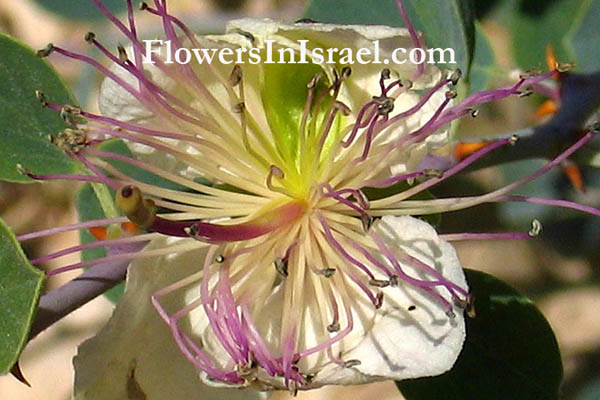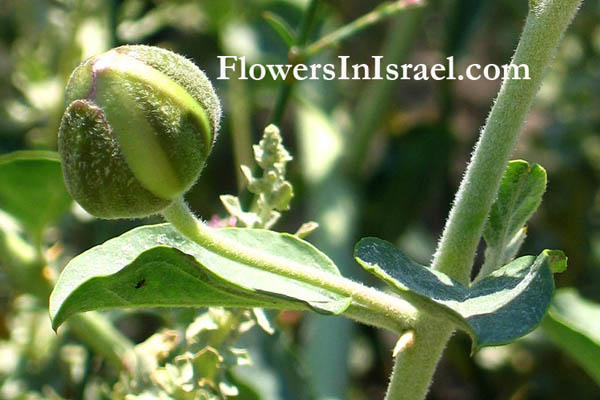צלף סיצילי
| Scientific name: | Capparis sicula Veillard | |
| Synonym name: | Capparis ovata Desf. | |
| Common name: | Sicilian caper | |
| Hebrew name: | צלף סיצילי | |
| Plant Family: | Capparaceae, צלפיים |

|
| Life form: | Shrub | |
| Spinescence: | Stipules | |
| Stems: | Underground, branched perennial stems and decaying annual aerial parts; procumbent, semi-erect, sometimes reaching up to 3 m long, glaucous | |
| Leaves: | Stipules usually stout; alternate, pubescence on leaves from lax to very dense | |
| Flowers: | Flower buds rounded or acute; floral pedicels thick and short, 2.5– 3.5 cm; flowers zygomorphic; stamens 100 to 150, anthers 3.5–4 mm, with acute apices | |
| Fruits / Pods: | Fruit oblong, pulp red; ripe seeds dark brown, 2.7–3 3 2.6–2.8 3 1.8–2 mm | |
| Flowering Period: | January, February, March, April, May, June, July | |
| Habitat: | Heavy soils | |
| Distribution: | Semi-steppe shrublands, Shrub-steppes, Deserts and extreme deserts | |
| Chorotype: | Irano-Turanian - Saharo-Arabian | |
| Summer shedding: | Perennating |

Flower bud Derivation of the botanical name: Capparis (latin), borrowed from Greek kapparis [κάππαρις], whose origin is unknown but probably West or Central Asia (Alkabara, kabar). Another theory links kapparis to the name of the island Cyprus (Kypros [Κύπρος]), where capers grow abundantly. Arabic kafara, to be hairy, villous. sicula, of Sicily. ovata, ovate, egg-shaped, with the broad end down. The Hebrew name: צלף, tzalaf, zalaph, which in the Bible is a proper name (Nehemia 3:30). The caper's fruit, the evyonah, is mentioned in Ecclesiastes 12:5 as a symbol of shortness of man's life, because very soon after it blossoms, the fruit scatters its seeds and the plant withers; "The almond-tree shall blossom… and the caperberry shall fail; Because man goeth to his long home…."
|